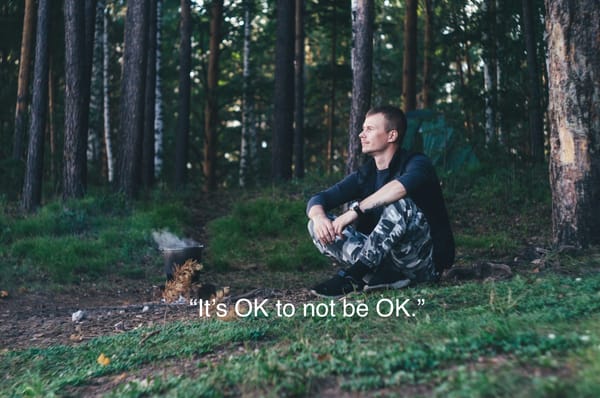Breaking Free from Overthinking: Calming Your Mind, One Thought at a Time
Because your brain isn’t a battlefield—it’s a home.

I used to lie awake at night replaying conversations I had earlier that day—over and over.
What I said. What I should’ve said. What they might have thought.
By 2 a.m., I wasn’t solving anything—I was just exhausted.
If you’re someone whose mind never seems to shut up, trust me: I get it.
Overthinking can feel like a never-ending loop: analyzing, doubting, second-guessing.
It tricks you into believing you’re being productive—when really, you’re just spinning your wheels in the mud.
So today, I want to share a few things that helped me step out of the noise—and into peace.

Why We Overthink (And Why It’s So Draining)
Overthinking often comes from a good place—wanting to get it right, make the best decision, protect ourselves from pain.
But in trying to control every outcome in our heads, we lose control of what matters most: our peace.
Instead of clarity, we get:
- Paralysis by analysis
- Constant worry
- Mental exhaustion
- Trouble sleeping
- Fear of making any decision at all
The truth is: overthinking doesn’t prevent mistakes. It just prevents living fully.

How I Started Calming My Busy Mind
This didn’t happen overnight—but with practice, things got quieter. Here’s what helped me most:
1. Get Out of Your Head and Into Your Body
When my thoughts spiral, I move.
I walk. I stretch. I touch something real—grass, wood, water.
Physical presence pulls us out of the mental fog and into the now.
2. Write It Down, Get It Out
Sometimes your brain just needs a place to unload.
I started journaling 5 minutes a day. No rules, no grammar police—just thoughts on paper.
It’s like opening a pressure valve for your mind.
3. Ask, “Is This Helpful?”
When a thought shows up for the tenth time, I ask:
Is this helping me? Is it leading somewhere?
If not, I gently let it go. Or say, “Not now.”
You don’t have to entertain every guest in your mental house.
4. Make the “Good Enough” Decision
Perfectionism fuels overthinking.
But most of the time, the “pretty good” decision is good enough.
Make a choice. Take a step. Adjust if needed.
Clarity comes from movement—not from sitting still in doubt.
5. Breathe on Purpose
Sometimes, all I do is pause and breathe deeply—three slow, intentional breaths.
It doesn’t fix everything, but it shifts something.
And that’s often all we need to reset.

Bonus Trick: Create a “Worry Window”
This one changed my life:
I give myself 10 minutes a day to worry or overthink if I need to.
I set a timer. I sit with the thoughts.
And then when time’s up—I move on.
It sounds silly, but it works.
Boundaries help the brain feel safer.

You Deserve a Quieter Mind
Overthinking doesn’t mean you’re broken. It just means your mind’s working overtime—and it needs some rest.
Peace doesn’t come from having all the answers.
It comes from trusting yourself to handle things as they come.
You are allowed to relax.
You are allowed to not know.
You are allowed to move forward even when it’s not perfect.
Because a calm mind doesn’t mean an empty one—it means a free one.



